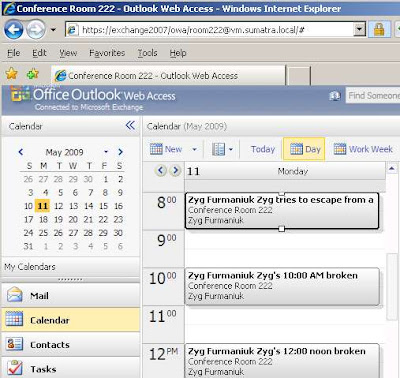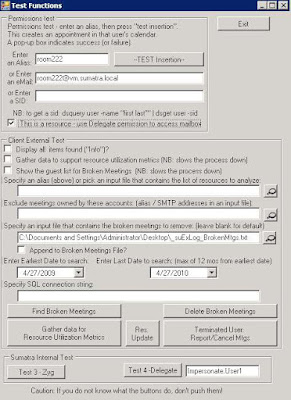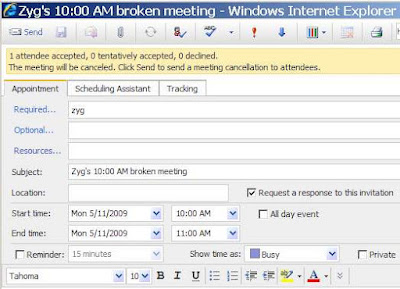The European calendar migration business has been picking up for us lately, and Oracle Calendar is the main thing folks want to get out of. Oracle Calendar is where Meeting Maker was five years ago, but they have a larger installed base and even more irate users (Beehive did not help things).
So let's look at Jerry's calendar with this entry, a mix of German and Spanish.
 Using our standard export tool on the OCS side, UNICPOUTU, this exports as:
Using our standard export tool on the OCS side, UNICPOUTU, this exports as:K Events:
S 9691980
D 30
T Du mußt Amboß oder Hammer sein, Señor
I 0
R N2
M Garcia Jerry
W Garcia Jerry
A TRUE 3 10O
Which is perfectly fine.
It comes into our database correctly as:
 And will insert into Exchange just as you see.
And will insert into Exchange just as you see.
So we're pretty sure we're covered here.
But, we've had some reports of some UNICPOUTU exports not including accented characters (and they're translated to reasonable substitutions so we know something is going on). The Oracle Admin Guide section on Calendar International Support goes into fair detail on how to configure for all your various options. As always, when in doubt, check with us. We want to take as much information to your target system as accurately as possible.
Sensitive to some of the other options that might be coming down the pike, we've added a new character set option to our conversion code:
 So in case we need to do Japanese or some other non-European character set we'll be able to respond.
So in case we need to do Japanese or some other non-European character set we'll be able to respond.
This means the OraCalReader also has a new command line switch: /CHARSET whose values values can currently be "UTF" and "ASCII."
One additional note: Time Zones. We've been handling European and Asia-Pac time zones in OCS to Exchange migrations for years. No worries.
 You'll notice that any of the recurrence pattern syntax is absent, as is any concept of the meeting ATTENDEES. Yes, you can take this and you can insert it as is into Exchange or any other calendar system that reads iCalendar. BUT without recurrences, attendees (and therefore attendee response status) and with no connection to managed conference rooms or resources.
You'll notice that any of the recurrence pattern syntax is absent, as is any concept of the meeting ATTENDEES. Yes, you can take this and you can insert it as is into Exchange or any other calendar system that reads iCalendar. BUT without recurrences, attendees (and therefore attendee response status) and with no connection to managed conference rooms or resources. It is CRUCIALLY better because while we are (still) lacking the recurrence patterns (don't worry, we re-create those), we have the attendee list and the attendee responses! This means we can re-create the full state of the meeting and make it live in Exchange. This also allows us to re-create the status in conference rooms.
It is CRUCIALLY better because while we are (still) lacking the recurrence patterns (don't worry, we re-create those), we have the attendee list and the attendee responses! This means we can re-create the full state of the meeting and make it live in Exchange. This also allows us to re-create the status in conference rooms.
 In the way of many marriages, Marge changes her name to Simpson after marrying her high school sweetheart, Orenthal.
In the way of many marriages, Marge changes her name to Simpson after marrying her high school sweetheart, Orenthal. If we change her name (leaving her alias alone) and go back into her calendar we note that the display name at the top is "Marge Simpson." New meetings are created as "Marge Simpson" but previously created meetings are still labeled "Marge Bouvier."
If we change her name (leaving her alias alone) and go back into her calendar we note that the display name at the top is "Marge Simpson." New meetings are created as "Marge Simpson" but previously created meetings are still labeled "Marge Bouvier."
 If Marge updates it (say by adding an agenda), the invitation comes into Russ's inbox looking like it's from Marge Simpson:
If Marge updates it (say by adding an agenda), the invitation comes into Russ's inbox looking like it's from Marge Simpson:
 SO NOW, let's look at it the other way: When the organizer modifies a meeting Marge is a guest in.
SO NOW, let's look at it the other way: When the organizer modifies a meeting Marge is a guest in.
 MARGE sees the following update come into her inbox (identifying her as Marge Simpson):
MARGE sees the following update come into her inbox (identifying her as Marge Simpson):










 How do we have the audacity to call it "broken?"
How do we have the audacity to call it "broken?"


 Pressing "Delete Broken Meetings" will remove them and log that to a report.
Pressing "Delete Broken Meetings" will remove them and log that to a report.

















 Coolness.
Coolness.